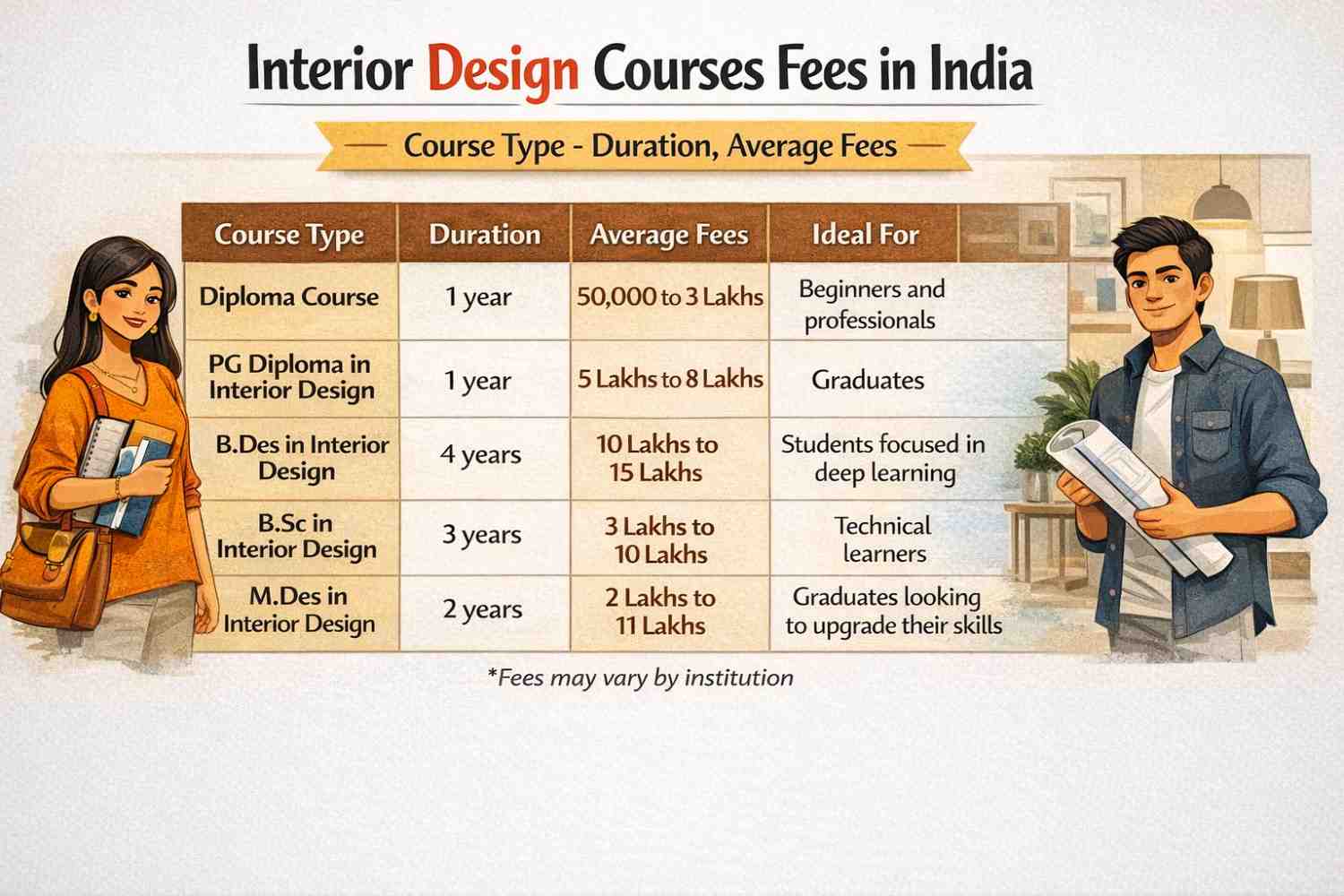Bachelor Courses After 12th: Explore Opportunities in Commerce, Science, and Arts
The number of higher education students rose to nearly 4.33 crore in FY22 from 3.42 crore in FY15, marking a 26.5% increase since FY15.
Choosing the right Bachelor Courses After 12th Commerce, science, or arts is a pivotal and life-changing decision that reshapes the pathway to both your personal growth and professional success.
With diverse levels of fields trending in the 21st century, ranging from commerce and science to arts, bachelor programs empower students to achieve industry-ready skills, specialized knowledge, and lucrative opportunities to uplift their bright careers.
From B.Com’s to finance to B.Tech’s engineering, and then BFA’s creative artistry, the choices are abundant for aspiring students.
In this blog, we will discuss the top Bachelor Courses After 12th Science, commerce, and arts fields, providing insights into their eligibility, career prospects, and trends in salary. Let’s get started!
Why Choose a Bachelor Course After 12th?
Choosing a bachelor’s degree after the 12th standard offers numerous benefits for aspirants looking to make the mark in their lustrous careers. Here are some of the typical advantages an undergraduate degree provides to these students after completing their secondary academics.
1. Opens Up a Multitude of Career Pathways: An undergraduate or bachelor’s degree after finishing class 12 is considered a common yet smart move. A world of career opportunities is opened up once you graduate. You are equipped with the skills and qualifications needed to thrive in various industries through these tailored programs. A strong candidate for well-paying jobs is what you become.
2. Enables Professional Networking: Joining a degree program provides students with industry professional engagement opportunities. These include professors and experts who can enrich their professional networks significantly. Prestigious institutions like AAFT streamline this experience by offering real-world projects, case studies, and global faculty access to ensure a diverse and world-class education.
3. Boosts Employability: Equipping yourself with skills and expertise that are in massive demand through a program at an undergraduate level sets you apart in the potential employer’s eyes. A degree not only enhances job security but also offers an economic downturn of safeguarding, where there is intensified job competition.
4. Imparts Specialized Knowledge: Pursuing an undergraduate degree in your passionate subject enables you to gain specialization and build stronger expertise in that field. This not only helps in the skill enhancement set but also boosts your employability chances.
5. Personal Growth and Development: Earning a degree promotes growth and self-development for the candidate. The college or university life experience introduces you to diverse levels of perspectives, cultures, and ideas, enriching your view of the world and honing your social and communication skills.
6. Long-Term Career Satisfaction: Obtaining a degree often paves the way for greater long-term career satisfaction. A strong educational foundation increases the likelihood of finding a profession that resonates with your interests and passions.
7. Pathway to Advanced Studies: A degree at an undergraduate level frequently serves as a gateway to advanced studies. These include master’s programs, doctoral degrees, or professional certifications. Earning a degree could be a significant first step if you have a long-term goal to attain specialized expertise or grab opportunities in demanding professions.
Bachelor Courses After 12th Commerce
Choosing the right Bachelor Courses After 12th Commerce is a life-changing decision that can provide the much-needed direction to your career. Let’s look at some of the most popular and academically enriching choices for students in the field of commerce.
1) Bachelors of Commerce (B.Com)
a) Admission Process: Merit or entrance exams like CUET, PU CET, and NPAT typically serve as a foundation basis for BCom admissions. This approach ensures a process that relies on fair selection.
b) Career Options: There are numerous finance, banking, and accounting career opportunities opening the commerce aspirants’ doors.
c) Course Fees: The average B.Com fee is INR 30,000 to INR 1,00,000 approximately. This offers them choices where they can pursue their bright careers on highly affordable budgets.
d) Freshers’ Salaries: The freshers post-B.Com can earn around INR 3-5 LPA easily as auditors, bankers, or consultants, among other professions.
e) Further Studies: You can even pursue advanced degrees such as CA, CS, CMA, or MBA after completing your B.Com. These help to develop yourself as a full-fledged professional.
Read Also: Professional Courses After 12th Arts: Top Options, Eligibility, and Career

2) Bachelor of Business Administration (BBA)
If you are interested in joining the Bachelor of Business Administration post-12th completion, you must have a minimum of 50% score. The following are important aspects to remember:
a) Admission Requirements: To begin with, you first take CUET and IPU CET, among other key entrance exams, which are conducted on a year-to-year basis.
b) General and Specialized BBA: There are basically two BBA course types: one is the General BBA, while the other one is the specialized BBA. General BBA refers to the typical BBA with marketing, finance, human resource management, and entrepreneurship (among other areas) as comprehensive subjects. Specialized BBA, in contrast, is pursued in any of these chosen fields.
e) Career Opportunities: You can set your career-empowering journey as a Finance Executive, Development Analyst, and Business Consultant, among other key roles, post-BBA. Here, you can easily earn up to INR 3 to 10 LPA.
3) Bachelor of Economics (B.Econ)
A Bachelor of Economics (B.Econ) is an undergraduate degree program of three years that is designed for aspirants aiming to make their banking and finance field career. Here are some key points for every aspiring candidate:
a) Admission Process: The admission criteria require your completion of 12th from an internationally-recognized board ranging from ICSE to state boards.
b) Course Fees: Normally, the B.Econ program expense might range between INR 15,000 to INR 65,000 per semester.
c) Further Studies: Later, you can take admissions an MA in Economics, a PhD, or even an MBA after your Bachelor of Economics completion.
d) Career Opportunities: Jobs in Indian Economic Services, banking and finance, and both private and foreign banks among other sectors can be found by graduates.
e) Salary Prospects: After completing your undergraduate Economics degree, you can easily earn INR 4 LPA per annum as a starting salary. It can go anywhere around INR 30-35 LPA with experience and technical skills you gain in academics.
Bachelor Courses After 12th Science
Choosing the right bachelor course post-12th Science can set a fulfilling career foundation. With numerous options available, each course offers unique opportunities to deeper dive into your chosen field and unlock your future potential.
1) Bachelor of Science (B.Sc) in Physics, Chemistry, Mathematics, or Biology
A Bachelor of Science (B.Sc.) is a highly recognized and prominent Bachelor course after the 12th Science student’s program with a specialization in the scientific domains such as Physics, Chemistry, Mathematics, and Biology. Here are some vital points to remember:
a) Course Duration and Subjects: A Bachelor of Science is an undergraduate degree program of three years that provides a solid foundation in physics, chemistry, botany, zoology, and even mathematics (a foundational subject for physics and astronomy), among other science fields.
b) Popularity and Demand: The scientific and technological achievements of the B.Sc. degree have made it one of India’s most sought-after undergraduate programs. In 2025, you may expect a higher number of other emerging scientific fields—from environmental science to data science to advance over time.
c) Further Studies: After completing your 12th, you can pursue a Master of Science (M.Sc.) in your preferred field. However, there are times when the candidate wants to select a different undergraduate program. In such cases, they can opt for their desired field, provided they meet the eligibility criteria adequately and possess the foundational knowledge required for the new stream.
d) Job Opportunities: Various companies actively seek deserving candidates who have completed their BSc from AAFT, among other renowned institutes.
2) Bachelor of Technology (B.Tech)
A Bachelor of Technology (B.Tech) is a four-year degree program at the undergraduate level (3 years if you are pursuing after your Polytechnic diploma completion). It helps to prepare students to transform into complete technology and engineering experts. Here are some key points to note:
a) Course Overview: This course enables students to attain profound technical skills and proficiency in problem-solving. This makes them profession-ready amidst the job-oriented competitive market.
b) Modern Curriculum: AI, Machine Learning (ML), and other advanced technologies are finding their places in the B.Tech’s curriculum. The core focus here is your specialized skills specialization and practical experience so you don’t get left behind in your professional stage.
c) Eligibility: You must have your Class 12th completed in Physics, Chemistry, and Mathematics (jointly, PCM) with a minimum of 50 to 75% aggregate marks from an accredited board.
d) Career Prospects: After your B.Tech completion, INR 4 LPA to INR 8 Lakhs/year is the average salary for engineers. Some of the renowned active recruiters for graduates in engineering are Deloitte, Pidilite, Maruti Suzuki, TATA Consultancy, Google, IBM Global Services, Accenture Services, and HCL Technologies.
Read Also: Top Trending Courses in 2025 for Students and Professionals

3) Bachelor of Computer Applications (BCA)
A Bachelor of Computer Applications (BCA) is a three-year undergraduate-level degree program. It is a focus on computer applications and software development. Here are some key points to remember:
a) Course Overview: A Bachelor of Computer Applications is an excellent choice for aspiring IT students who don’t want to get into the core technical details hassles.
b) Skills Acquired: The key skills acquired in BCA are C++, Java, and Python, among other programming languages. In addition, you’ll also gain expertise in Database Management Systems (DBMS), Cybersecurity, operating systems (Windows, Linux), computer networks, and web development technologies including HTML, CSS, and JavaScript.
c) Career Opportunities: BCA degree graduation can lead to software development, web development, system analysis, network administration, database administration, or IT project management careers. Moreover, other trending specializations are IT project management, digital marketing, cybersecurity analysis, and IT training roles.
Bachelor Courses After 12th Arts
Pursuing a 12-completion bachelor’s degree program in the field of arts Arts opens the door to a wide range of academic as well as professional opportunities. These courses not only help build a solid foundation in your chosen field but also help foster critical thinking, communication, and analytical skills.
1) Bachelor of Arts (B.A.) in History, Political Science, Sociology, or Psychology
The Bachelor of Arts (BA) is a three-year undergraduate-level degree course that is offered in various fields. Here are some key BA Course points you must remember:
a) Eligibility and Admissions: A candidate must complete their 12th with a minimum score of 50% from an internationally approved board.
b) Job Opportunities: Specialization-dependent job opportunities are available post-BA course. Careers in Civil Services, teaching, content writing, or further studies like an MBA or law can be pursued.
c) Salary Prospects: BA Economics graduates can earn around INR 7 to 8 LPA, while BA English graduates earn around INR 3-4 lakhs annually. These figures highlight the specialization-based earning potential.
Read Also: Best Courses After 12th Arts – Top Career Options for Arts Students
2) Bachelor of Fine Arts (BFA)
The Bachelor of Fine Arts (BFA) is an emerging undergraduate-level degree program that offers numerous aspiring candidates scopes. Here are the key points for every aspirant in the Fine Arts domain:
a) Program Overview: The BFA is a four-year Bachelor Course After 12th Arts that covers numerous specialized Fine Arts specializations. These include photography, radio courses, painting, drawing, sculpture, radio courses, and dance.
b) Eligibility Criteria: To be eligible for the BFA degree course admission, you need to have your 10+2 completed from an accredited board with at least a 50% aggregate mark.
c) Admission Process: BFA program admissions are entrance tests and merit-based, as per the institute you have chosen like AAFT.
d) Course Fees: The average BFA program course fee is typically around INR 3,000 to INR 5.84 lakh, based on the institutes.
e) Career Opportunities: Graduates after BFA have promising career prospects in various domains. Some of those domains include fashion, marketing agencies, boutiques, and publishing houses.
3) Bachelor of Journalism and Mass Communication (BJMC)
The Bachelor of Journalism and Mass Communication (BJMC) is a highly sought-after undergraduate-level three-year duration program that opens up a diverse range of media-centered career opportunities. Here’s a detailed overview you need to remember:
a) Program Overview: Media, journalism, TV, and print media, among other media aspects, are introduced to students by the 3-year BJMC course.
b) Career Paths: Media, news production, journalism, and related fields can be worked in by graduates, utilizing their skills in various roles.
c) Research Methodologies: The program strongly emphasizes research methodologies to verify news authenticity, ensuring accurate and reliable reporting.
d) Technological Skills: Students learn the software and technologies used for creating, investigating, and presenting news and media pieces.
e) Specializations: Electronic Media, Print Media, Camera Handling & Lighting, Sound Editing, and Film Making are included in the specializations offered.
f) Career Preparation: Diverse roles in TV news, social media reporting, advertising, and corporate communication, among other growing fields, are prepared for by the course.
Read Also: Top 7 Creative Courses to Spark Inspiration in Young Minds

How to Choose the Right Bachelor Course
Choosing the perfect undergraduate (UG) course is a monumental decision that requires careful thought and attention. Here are eight tips to help you how to make a well-informed choice:
1) Goals and Strengths: Your interests and abilities should be assessed to start. A subject area that aligns with your principles, personality, and skills should be chosen. Remember, this topic will be studied for years, so something genuinely enjoyable should be picked.
2) Research and Prospectus: A list of potential courses should be compiled, and each one should be thoroughly researched. Online resources, college prospectuses, and advice from family and friends should be used. Prospectuses provide detailed information about the institution, courses, entry requirements, amenities, and student support services.
3) Find the Right Institute: After selecting your courses, the right institution should be chosen. Extensive research using independent sources like professional posts and news reports is required. Factors such as the institution’s rank, admission criteria, deadlines, reputation, and necessary approvals should be considered.
4) Course Material: The course material should match your interests. It should be checked if the core components are engaging and if there are enough optional modules. Courses with the same name can vary significantly in content, teaching methods, and evaluation, so descriptions should be read carefully.
5) Where to Study: It should be decided whether to study at home or abroad. Moving might be necessary for specific courses or universities. Some students value the experience of living in residence halls or shared housing, while others prefer the opportunity to live in a different part of the country.
6) Career Opportunities: A career-rewarding course should be chosen as an asset for anybody’s life. The career type you want and whether a specialized degree is necessary should be considered. Some fields, like accounting or medicine, may require specific degrees, while others do not.
7) Financial Considerations: The financial implications of your chosen course should be assessed. Tuition, textbooks, accommodation, and living expenses, among other costs, should be calculated.
Read Also: Top 20 In-Demand Job Oriented Courses for 2025
Conclusion
Choosing the right Bachelor Courses After 12th Science, Commerce, or Arts is more than just an academic-empowering decision—it’s your professional journey and foundation for personal growth. Whether you’re aspiring to perform global market analysis, cutting-edge technology design, or captivate audiences with artistic brilliance, your choice today will define your success tomorrow.
Yet, the process can feel overwhelming as there are numerous evolving courses, eligibility criteria, and career prospects that need to be considered. At AAFT, we understand your aspirations and are committed to equipping you with all the required and career-empowering skills, confidence, and opportunities you need to excel in your chosen field.
Take the first step toward a brighter and more fulfilling future. Enroll at AAFT today and transform your ambitions into reality. Your journey to greatness starts here.











